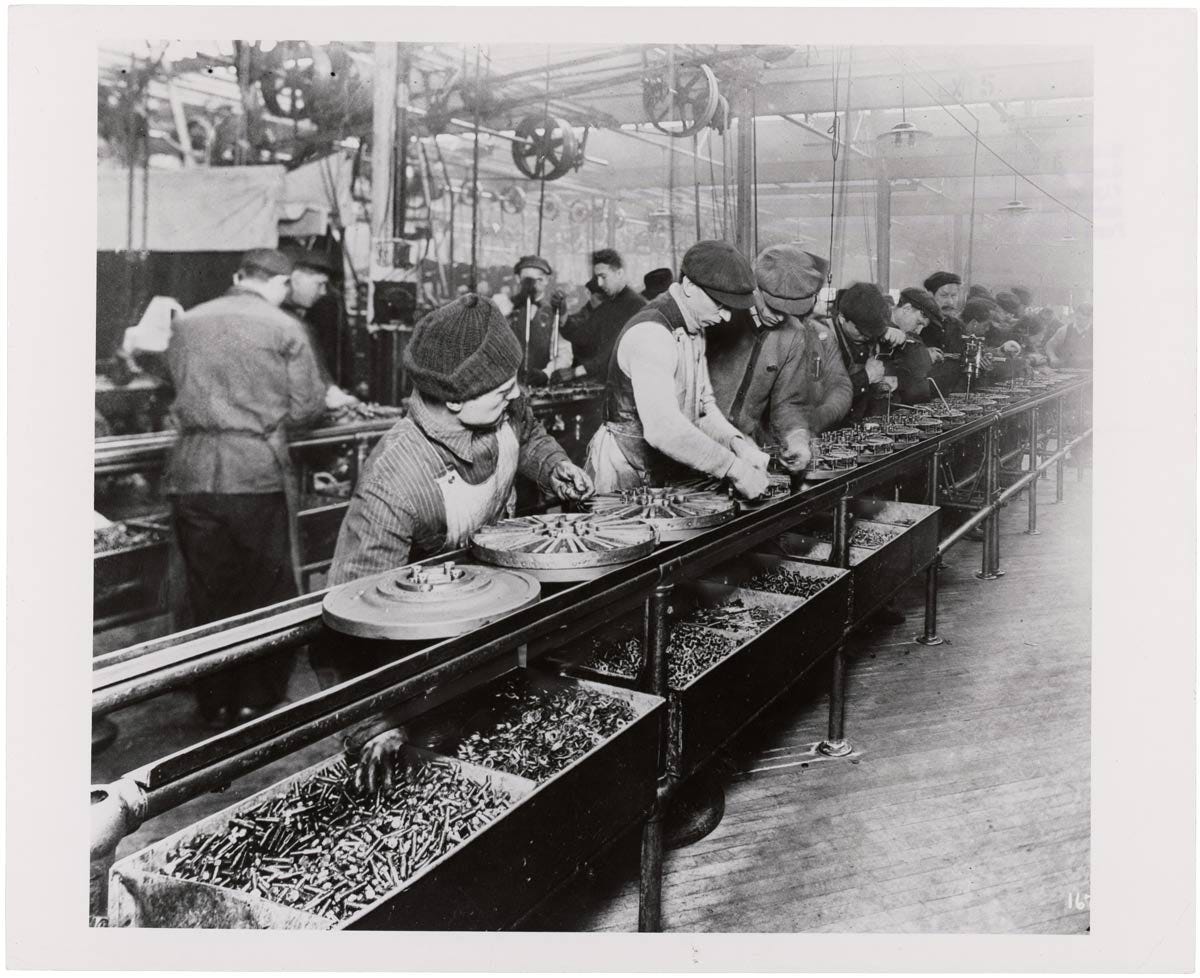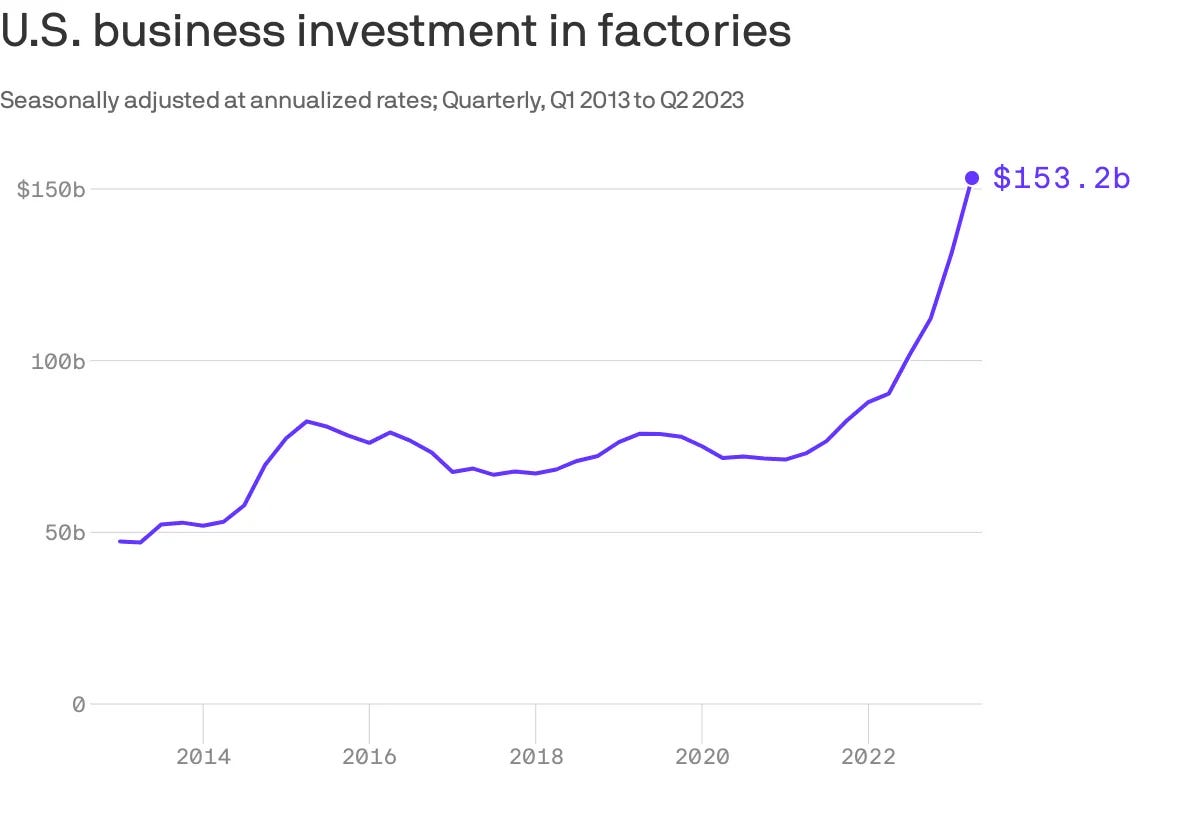Why the Poor Stay Poor in America - A Robust Industrial Policy
Welcome to The Poverty Trap: Why the Poor Stay Poor in America. I’m thrilled that you signed up to read my newsletter, and I hope that you will enjoy participating in our community. Everyone deserves the opportunity to thrive in our country, and we can work together to make that happen. Please share this newsletter with your friends and family when you have a spare minute. Thanks! If you have the means, do upgrade your subscription to Paid—your financial support of my writing will help me to continue and expand the newsletter!
A Robust Industrial PolicyTo Temper Inequality, Tackle The Climate Crisis And Act For The Common GoodThis post goes out to both free and paid subscribers, but if you are not already a paid subscriber and value this effort and our growing community, please consider upgrading to a paid membership. Thanks in advance for your financial support of my work —it’s what allows me to keep researching and writing. And thanks to all the new, paid yearly subscribers who signed up during our winter sale! You are appreciated! “Industrial policy” in its broadest sense refers to the deployment of policy tools with the intent of influencing how we create value—what goods (and services) we produce and how we produce them…The common thread in different understandings of industrial policy is a recognition of the role of government as a key actor in shaping the world of production in line with a public purpose. From a Roosevelt Institute report published May, 2023. What is the “role of government” in helping shape production of goods and services for a public purpose? If you believe, as I do, that our government exists to do the most good for the most people, then you likely would agree that crafting a strong industrial policy plays a key role in the ways each Administration and Congress steers our economy. For example our industrial policy today, what President Biden calls a “modern American industrial strategy” is being used to temper our extreme inequality, change the trajectory of the climate crisis and generally improve the standard of living and quality of life for everyone, not just the few. The Roosevelt Institute, for example, describes an industrial policy that implements a broad transformation and includes a focus on “well-being” as primary factors:
The history of industrial policy in the United States is fascinating–it navigates the twists and turns of various administrations and political parties, but has not always come down on the side of the public good and/or the “well-being” of most of our population. The Council on Foreign Relations provided a more traditional definition of industrial policy in an article published in September 2023, that does not explicitly include a reference to “the public good” or to making the economy more fair for all of us :
Examples of the tools government typically uses to implement industrial policy are: subsidies and tax incentives given to specific industries and production sectors, laws, financial investments in research and development and tariffs—to support particular industries that are strategically important. The goal is to… “incentivize the production of more of some goods and services and less of others.” A recent example of the use of an industrial policy tool is the call by Ohio Senator Sherrod Brown, a Democrat, to permanently ban the importation of electric vehicles from China. While others recommend a high tariff on the import of these vehicles, Senator Brown has suggested a full ban to President Biden because: “Chinese electric vehicles are an existential threat to the American auto industry." My knowledge of industrial policy is limited to what I’ve read, so I’ll rely on the experts to help us make sense of the major policy changes and laws the Biden Administration has implemented in the last three-plus years . This new policy direction has lifted our country out of the Covid and economic crises, increased manufacturing for the first time in decades and reduced greenhouse gases and ignited the green energy industry. In addition to independent research institutes and think-tanks, like the Roosevelt Institute, Brookings Institution, Economic Policy Institute, and the Council on Foreign Relations and the Congressional Budget Office, another expert is Robert Reich who has been writing about industrial policy for decades. Professor Reich wrote a post last year on his Substack newsletter touting President Biden’s success with his “new” industrial policy, saying:
I’m “borrowing” this chart so you can see the trajectory of investment that businesses have made in factories in the last few years. And it is not a coincidence that the U.S. also has had 39 straight months of job growth, with the March 2024 jobs report showing the addition of 303,000 new jobs with the unemployment rate falling to 3.8%, although manufacturing jobs showed no change during March. Right now, our country is facing at least two major crises: raging economic inequality and climate change. Whether embracing a particular “industrial policy” or “modern American industrial strategy”, our government has always stepped up in times of economic upheaval to guide (and yes, “bail out”) our country’s industries to prevent financial collapse and the ruin of livelihoods and lives. We also have made choices that some industries and particular locations in our country need more of a boost than others — not “choosing winners and losers” as some critics of industrial policy have said The Biden Administration and its allies in Congress passed four major pieces of legislation in the last (117th) Congress that invest in a better future.
The administration’s overall industrial policy driven by this legislation is also “place-based”, meaning it targets specific areas of the country in need of rejuvenation:
By the way, government funds to clean up from natural disasters like hurricanes, tornadoes, floods, droughts, wild fires and more, which are increasing in severity and frequency because of changes to our climate, currently total between 100-150 billion a year, give or take a few billion. Any money our government earmarks to lesson the impact of the climate crises (like incentives and tax credits for clean energy development rather than continued funding of fossil fuels, included in the above legislation ) is an investment in the health and well-being of our country and the future of a livable planet. ———————————————————————————————————— I’d love to hear what you think about these types of government investments? The four major pieces of legislation passes in 2021 and 2022–are they already having a positive impact on our economy, and more importantly, our lives? Or are we spending too much? Your ideas are all welcome in the Comment Section below ! You’re on the free list for The Poverty Trap: Why the Poor Stay Poor In America. All posts are free for now, but if you’d like to join the crowd, please support my work by becoming a paid subscriber. |
Older messages
A Few Weekend Readings: (Somewhat) Good Climate News, Dollar Stores Are Closing, and Medicaid Takes Your Home Post…
Sunday, March 24, 2024
Listen now (10 mins) | This post goes out to both free and paid subscribers, but if you are not already a paid subscriber and value this effort and our growing community, please consider upgrading to a
What You Need To Know About Your Mortgage Lender & Your Mortgage Servicer...
Wednesday, March 13, 2024
Listen now (11 mins) | A Mortgage Servicer Is Not Always Your Lender...And Other Problems ͏ ͏ ͏ ͏ ͏ ͏ ͏ ͏ ͏ ͏ ͏ ͏ ͏ ͏ ͏ ͏ ͏ ͏ ͏ ͏ ͏ ͏ ͏ ͏ ͏ ͏ ͏ ͏
Where Climate Change Meets Gentrification...
Monday, March 11, 2024
Listen now (15 mins) | The Modern Way To Displace Low Income Residents
A Few Weekend Readings
Monday, March 11, 2024
Rising Rents Lead to Rising Evictions Which Culminate In Rising Homelessness — Not A Positive Trio. ͏ ͏ ͏ ͏ ͏ ͏ ͏ ͏ ͏ ͏ ͏ ͏ ͏ ͏ ͏ ͏ ͏ ͏ ͏ ͏ ͏ ͏ ͏ ͏ ͏ ͏
Is The U.S. Economy "Rigged" In Favor Of The Wealthy & Against The Poor & Middle Class?
Monday, March 11, 2024
Listen now (13 mins) | Rude Spoiler Alert: Yes, But We Can Change It... ͏ ͏ ͏ ͏ ͏ ͏ ͏ ͏ ͏ ͏ ͏ ͏ ͏ ͏ ͏ ͏ ͏ ͏ ͏ ͏ ͏ ͏ ͏ ͏ ͏ ͏ ͏ ͏ ͏ ͏ ͏ ͏ ͏
You Might Also Like
This Dreamy Dress Trend Will Be Everywhere In 3 Months
Friday, February 28, 2025
Fairytale moments from London Fashion Week. The Zoe Report Daily The Zoe Report 2.27.2025 This Dreamy Dress Trend Will Be Everywhere In 3 Months (Runway) This Dreamy Dress Trend Will Be Everywhere In 3
3x3: February 27, 2025
Friday, February 28, 2025
February is the worst month ͏ ͏ ͏ ͏ ͏ ͏ ͏ ͏ ͏ ͏ ͏ ͏ ͏ ͏ ͏ ͏ ͏ ͏ ͏ ͏ ͏ ͏ ͏ ͏ ͏ ͏ ͏ ͏ ͏ ͏ ͏ ͏ ͏ ͏ ͏ ͏ ͏ ͏ ͏ ͏ ͏ ͏ ͏ ͏ ͏ ͏ ͏ ͏ ͏ ͏ ͏ ͏ ͏ ͏ ͏ ͏ ͏ ͏ ͏ ͏ ͏ ͏ ͏ ͏ ͏ ͏ ͏ ͏ ͏ ͏ ͏ ͏ ͏ ͏ ͏ ͏ ͏ ͏ ͏ ͏ ͏ ͏ ͏ ͏ ͏ ͏ ͏
Should You Do Cardio Before or After You Lift Weights?
Thursday, February 27, 2025
View in Browser Men's Health SHOP MVP EXCLUSIVES SUBSCRIBE Should You Do Cardio Before or After You Lift Weights? Should You Do Cardio Before or After You Lift Weights? If you're combining two
This Google Tool Can Hide Your Personal Info From Search
Thursday, February 27, 2025
Alexa Is Getting an AI Upgrade. Take your privacy back from Google Search. Not displaying correctly? View this newsletter online. TODAY'S FEATURED STORY This Google Tool Can Help Hide Your Personal
“Shakespearean Red,” Dirty Blonde, & More Of Spring’s Biggest Hair Color Trends
Thursday, February 27, 2025
Plus, the spiritual meaning of the new moon, your daily horoscope, and more. Feb. 27, 2025 Bustle Daily LIFE Did Smart Phones Make Us All Stream-Of-Consciousness Texters? Sajina Shrestha self-
Her Student Loans Were Forgiven. Then They Came Back.
Thursday, February 27, 2025
Today in style, self, culture, and power. The Cut February 27, 2025 PERSONAL FINANCE She Thought Her Student Loans Were Gone. Then They Came Back to Haunt Her. Student borrowers are seeing ghost loans
How fast-food apps took over the drive-thru
Thursday, February 27, 2025
Around the world, King Cake inspires community
"Love remains a jewel in the hand, guarded"
Thursday, February 27, 2025
͏ ͏ ͏ ͏ ͏ ͏ ͏ ͏ ͏ ͏ ͏ ͏ ͏ ͏ ͏ ͏ ͏ ͏ ͏ ͏ ͏ ͏ ͏ ͏ ͏ ͏ ͏ ͏ ͏ ͏ ͏ ͏ ͏ ͏ ͏ ͏ ͏ ͏ ͏ ͏ ͏ ͏ ͏ ͏ ͏ ͏ ͏ ͏ ͏ ͏ ͏
Win Two Tickets To A Major Music Festival & A Shopping Spree!
Thursday, February 27, 2025
Thanks To Marshalls. Feb. 27, 2025 Bustle Daily Enter To Win Tickets To A Major Music Festival, Thanks To Marshalls Presented by Marshalls Enter To Win Tickets To A Major Music Festival, Thanks To
Cat Story
Thursday, February 27, 2025
How we got that cat ͏ ͏ ͏ ͏ ͏ ͏ ͏ ͏ ͏ ͏ ͏ ͏ ͏ ͏ ͏ ͏ ͏ ͏ ͏ ͏ ͏ ͏ ͏ ͏ ͏ ͏ ͏ ͏ ͏ ͏ ͏ ͏ ͏ ͏ ͏ ͏ ͏ ͏ ͏ ͏ ͏ ͏ ͏ ͏ ͏ ͏ ͏ ͏ ͏ ͏ ͏ ͏ ͏ ͏ ͏ ͏ ͏ ͏ ͏ ͏ ͏ ͏ ͏ ͏ ͏ ͏ ͏ ͏ ͏ ͏ ͏ ͏ ͏ ͏ ͏ ͏ ͏ ͏ ͏ ͏ ͏ ͏ ͏ ͏ ͏ ͏ ͏ ͏ ͏ ͏ ͏


